Forward>>
Thinkers
An Emory master’s program is making global development effective, accountable, and real
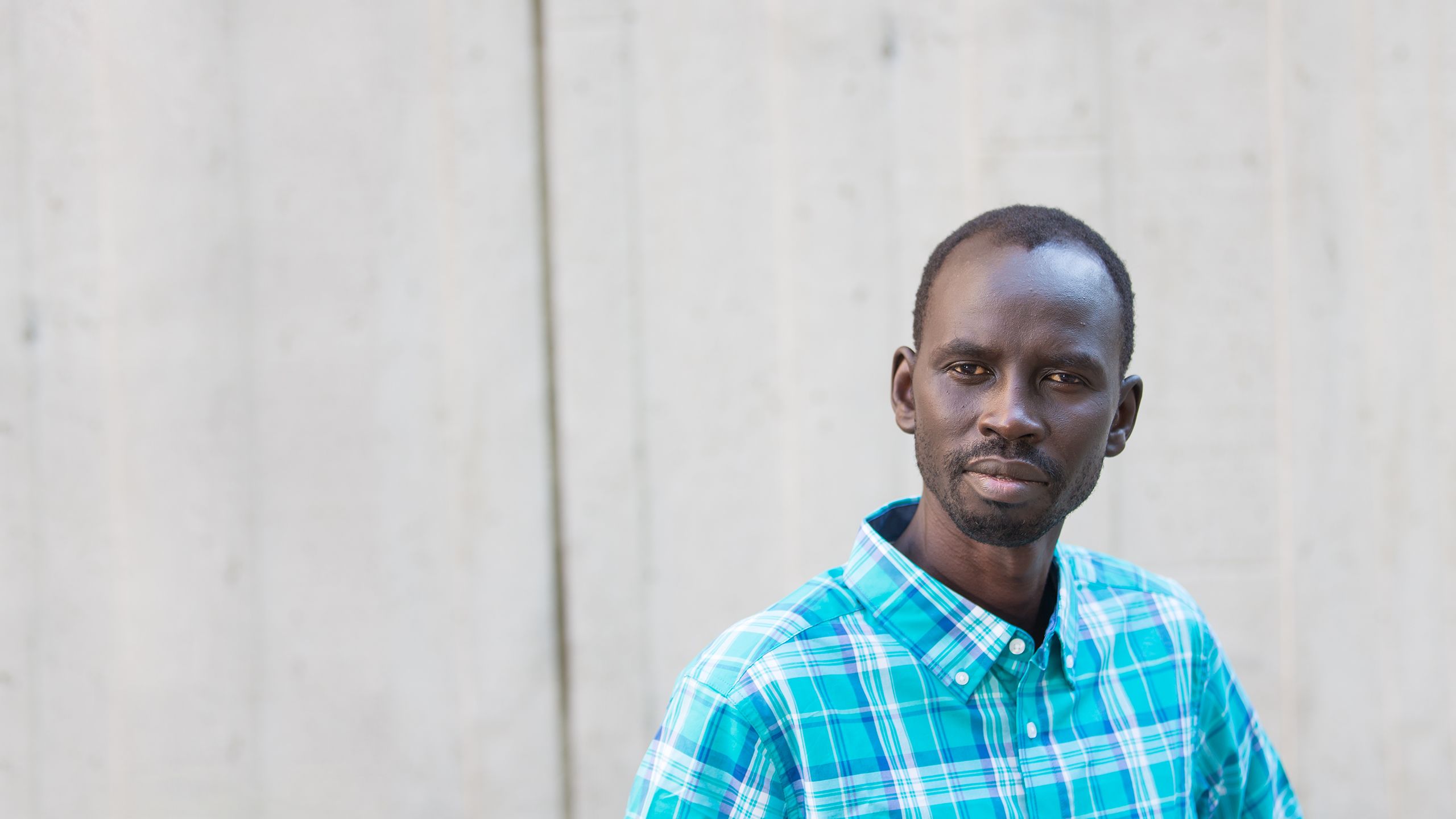
Garang Buk Buk Piol 20G 21MPH doesn’t know his birthday.
His passport and other legal documents say it was January 1, 1979. That’s almost certainly not accurate, but he comes from a place where a lot of things are more important than birth dates.
Buk Buk was born near Aweil, a city in what is now South Sudan, sometime during 1979 or 1980.
In 1983, a scant decade after the First Sudanese Civil War ended on rickety terms after seventeen years of conflict and violence, the second civil war broke out. It would last more than two decades, claim two million lives, and displace four million more.
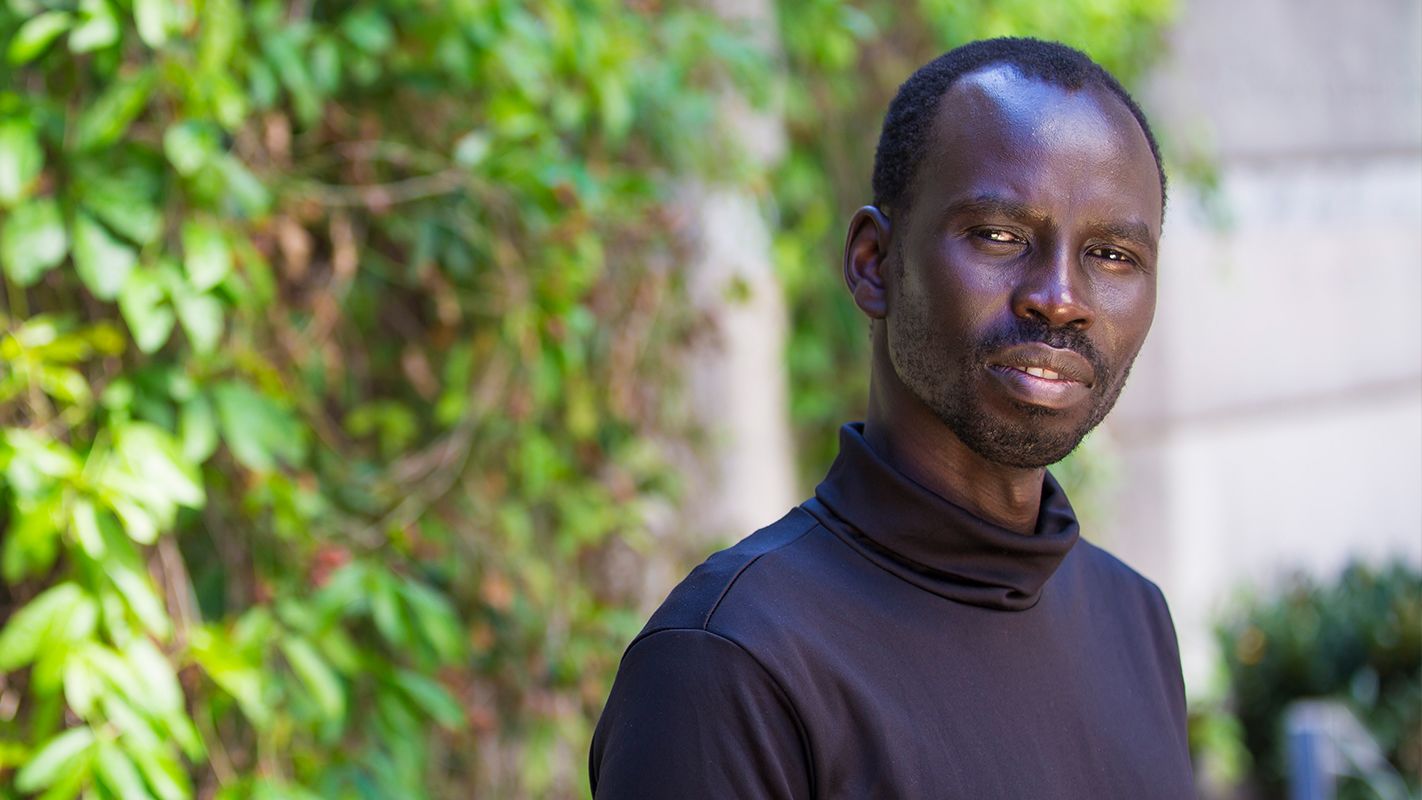
Garang Buk Buk Piol was once a child soldier in Sudan, but is now pursuing a master's degree in global development at Emory.
Whatever the actual date of his birth, that’s the world that Buk Buk was born into. When he was a small child, uniformed militants came to his village and separated the men from the women and children. He remembers seeing many of the men burned to death, along with much of the village itself.
That day, you could say that Buk Buk was reborn. Determination bloomed inside him. “I did not want to see my village burn again,” he says.
Over time, he was to become a child soldier, a diligent student, a dedicated public health worker, a husband and father, and a respected community leader. He is now a graduate student in the Master’s of Development Practice (MDP) program in Emory’s Laney Graduate School, studying global development so that he can return to foster social and economic progress in his home country.
He has come a very long way to be here.

Garang Buk Buk Piol was once a child soldier in Sudan, but is now pursuing a master's degree in global development at Emory.
Garang Buk Buk Piol was once a child soldier in Sudan, but is now pursuing a master's degree in global development at Emory.
Good Intentions
Emory’s MDP program was established ten years ago, with an initial grant from the John D. and Catherine T. MacArthur Foundation, to address a problem that up until then, no one really wanted to talk about: Sometimes the road to nowhere can be paved with good intentions.
Leaders of the MacArthur Foundation had brought together a group of twenty global development leaders—including Jeffrey Koplan, former director of the Centers for Disease Control and Prevention and now Emory’s vice president for global health—to ask the hard questions. Why wasn’t global development working? Many competent, well-meaning organizations were certainly doing a lot of good in the world’s poorest places, but shouldn’t the collective impact be greater?
“If you want people to know how to do something, you need to have them do it and not just talk about doing it.”
—David Nugent
The group conducted an extensive study and produced a weighty report that yielded two key findings. One, global development experts tend to specialize—in public health, economics, politics, and so forth—with almost no integration among their areas of practice, so opportunities to collaborate and share resources for better results were being missed. And two, most educational programs did not require field experience as part of training future development leaders.
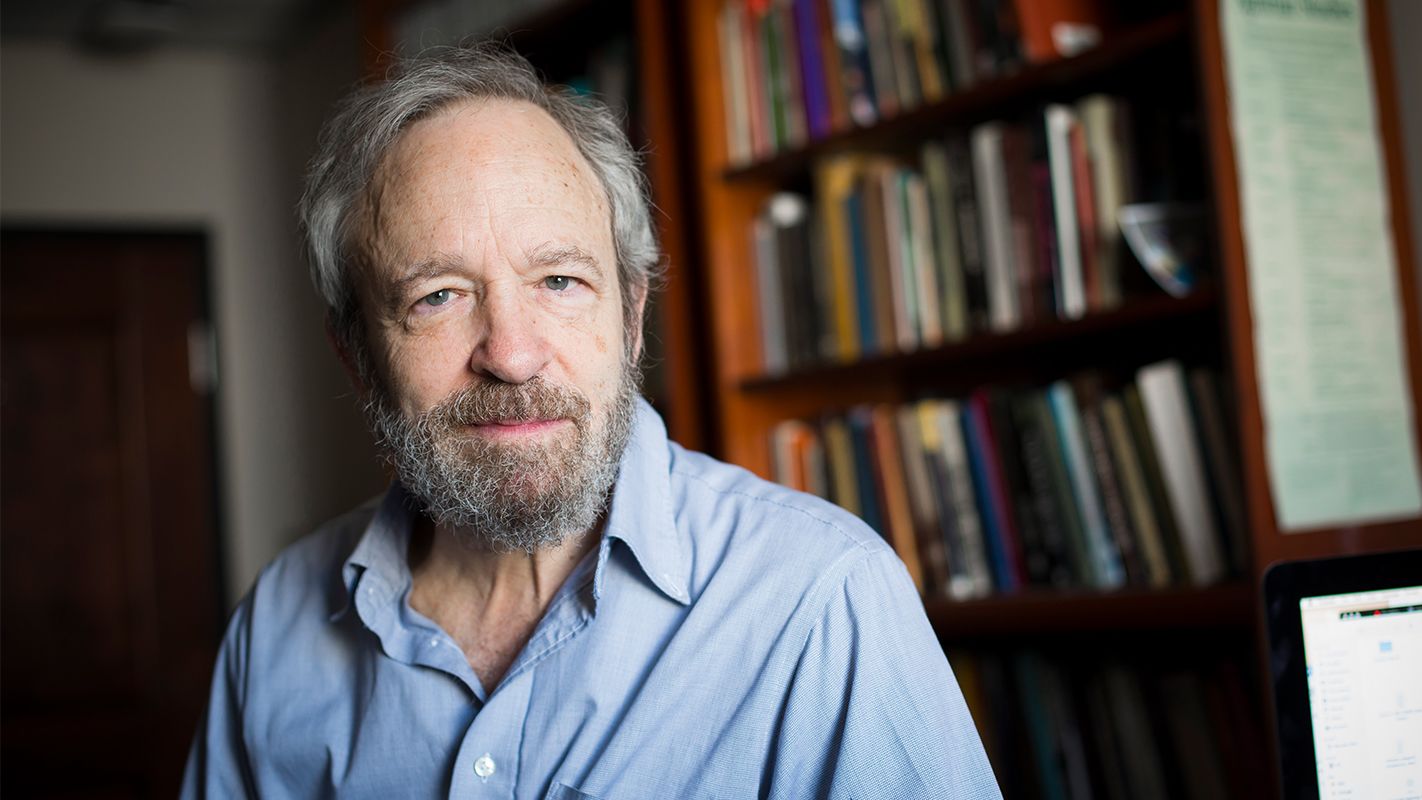
MDP program director David Nugent says one of the key areas of emphasis is monitoring and evaluation, now a specialty discipline that was long overlooked in the field of global development. “We want to build things, not tear them down,” he says.
“There was a recognition that field training should be central,” says David Nugent, professor of anthropology and founding director of the Emory MDP program. “If you want people to know how to do something, you need to have them do it and not just talk about doing it.”
In response to the report, the MacArthur Foundation decided to fund a new wave of global development education that focuses on the integration of applicable academic disciplines as well as field experience. In 2008, 144 universities applied for funding and Emory’s became one of the first nine MDP programs in the world—and one of only two in the US, along with Columbia University. There are now some thirty worldwide.
“Our students do interdisciplinary work on real-world problems,” Nugent says. “They take courses all across the university in addition to the seminars we have developed ourselves for the program. And to honor the spirit of that report, we send all our students into the field—twice.”
A decade after its founding, the Emory MDP program is known for pushing students to take a respectful, realistic approach to global development and to learn from the world rather than trying to teach it. “Theories are fine,” Nugent says, “but if they have no relationship to what happens on the ground, the theories need to change.”

MDP program director David Nugent says one of the key areas of emphasis is monitoring and evaluation, now a specialty discipline that was long overlooked in the field of global development. “We want to build things, not tear them down,” he says.
MDP program director David Nugent says one of the key areas of emphasis is monitoring and evaluation, now a specialty discipline that was long overlooked in the field of global development. “We want to build things, not tear them down,” he says.
When Sparks Fly
After the attack on his village, like thousands of South Sudanese youth who were torn from home and family, Buk Buk set off on a brutal journey, eventually making his way to Ethiopia on foot. Later, at about age eleven, he was conscripted into the Sudan People’s Liberation Army (SPLA), in which he served as a solider for five years.
“I realized right away that he was different from others I had worked with. . . . He had this welcoming demeanor. He was very eloquent and driven.”
—David Stobbelaar
That’s when a pattern began to emerge, one that has followed Buk Buk all the way to Emory. In the midst of unrest, violence, and hopelessness, people sensed a spark of promise in this bright, gentle, determined young man. He was chosen by an army officer to be his bodyguard and, in many ways, his protégé. That recognition was Buk Buk’s first glimpse of a better future. “He had good intentions,” Buk Buk says. “He knew the reason why he was fighting. This is the person who changed my perception, who started telling me how important I would be if I’m educated. Every day we were together, if we went into any combat, he would tell me that if I go to school I will survive.”
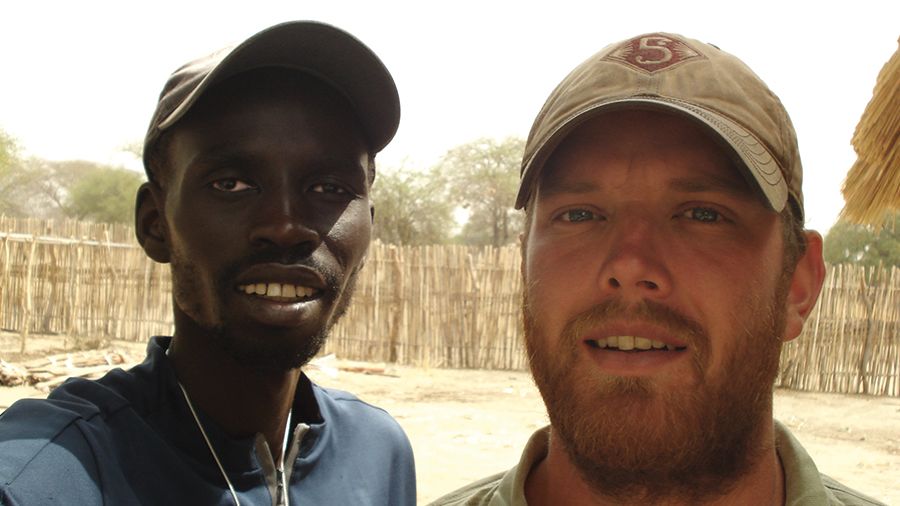
Buk Buk with Carter Center colleague and friend David Stobbelaar.
With the officer’s help, Buk Buk attended secondary school in South Sudan. Not long after, he was working as an apprentice to a local electrician when he encountered The Carter Center’s Guinea Worm eradication program. Seeing a chance to make a difference in area communities, he joined the program as a volunteer, then became a field officer.
The Emory-affiliated Carter Center has been leading the global fight against Guinea worm disease—a neglected tropical disease caused by an ancient parasite, contracted through larvae that lurk in water sources—for more than two decades. Thanks to efforts by the center and a range of public health partners, including the governments of endemic countries, incidence has been reduced from an estimated 3.5 million in 1986 to twenty-eight known cases in 2018. When the disease is officially eradicated, it will be the second human disease in history, following smallpox, and the first to be eradicated through education and behavior change rather than a vaccine.
The partnership between Emory and The Carter Center has led a steady stream of students and alumni to the Guinea Worm eradication program, including the current director, Adam Weiss 15MPH; the South Sudan country representative, Jake Wheeler 08C; and Emily Staub 97OX 99C, associate director of communications and media relations for The Carter Center, who has worked to build visibility for the program since 2000.
“Each of these cases is a human being with a family and a life,” says Weiss, who was appointed director in 2018 after nearly fifteen years working in four endemic countries. “These aren’t just numbers, these are people. This is why tens of thousands of volunteers, technical advisers, and staff are working in thousands of villages to find and contain the last cases of this miserable disease.”
South Sudan is one of just five countries left on the radar and the forward momentum is strong, with remarkable progress made in recent years.
But continuous conflict in the region has made field work difficult and dangerous. Carter Center and local staff are especially valued for their knowledge and ability to navigate affected areas.
David Stobbelaar was serving as a technical adviser for the South Sudan Guinea Worm program when he met Buk Buk in 2008. Stobbelaar had worked with many “lost boys”—former South Sudanese child soldiers—and found that because of their experiences they often struggled with mental illness such as PTSD, substance abuse, and a lack of motivation.
“I realized right away that Buk Buk was different from others I had worked with,” says Stobbelaar, who now lives in Malawi. “He had this welcoming demeanor. He was very eloquent and driven. He was really good at following up and analyzing data, and he was able to provide a quick outline of what was going on in communities and come up with strategies.”
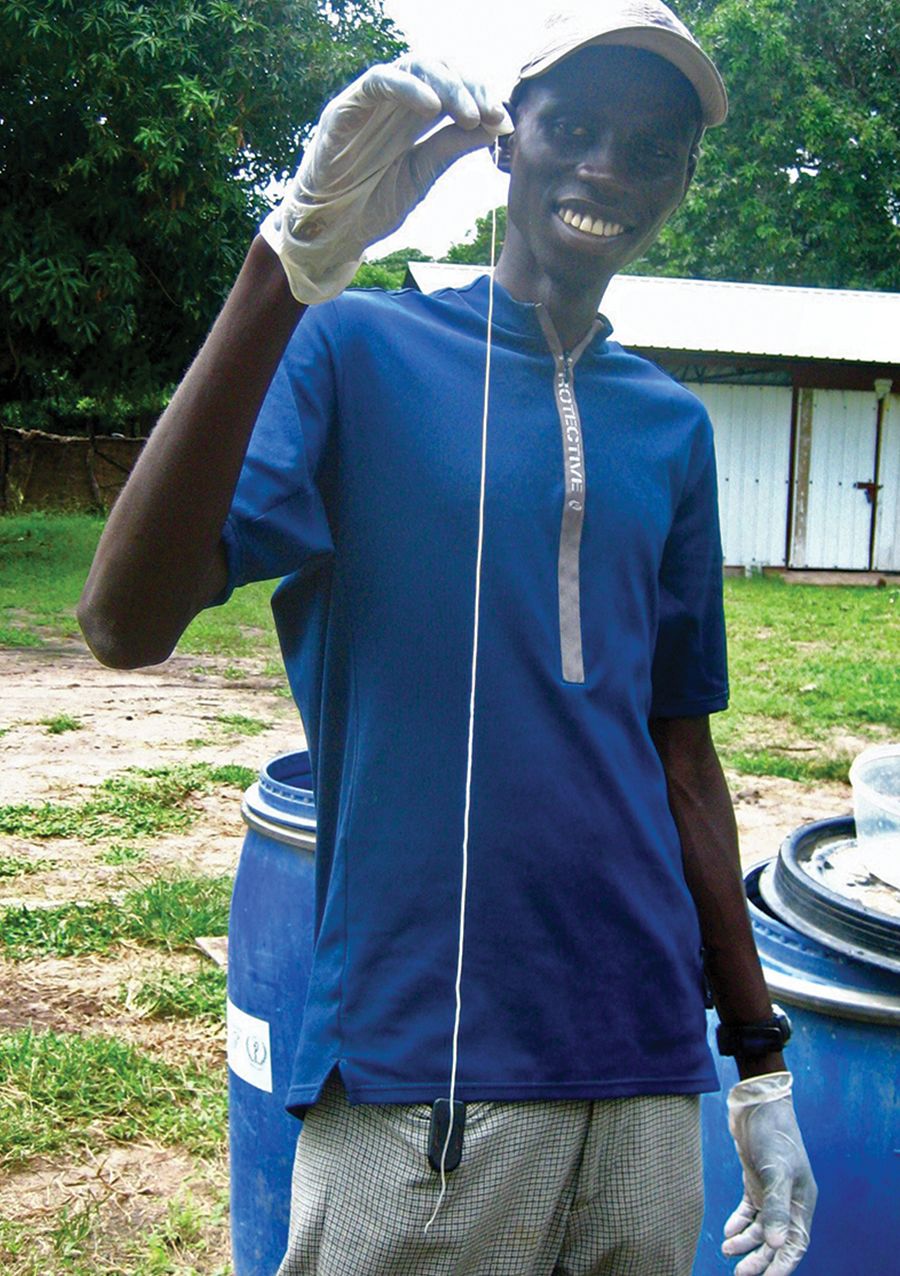
Buk Buk shows a Guinea worm extracted from a patient.
During Buk Buk’s six years with the Guinea Worm program, he saved his earnings for a university education and eventually completed a bachelor’s degree at an institution in Nairobi.
When he returned to Juba, Buk Buk worked with some community-based organizations, but opportunities for viable, long-term employment were scarce.
He married and started a family, but believed he’d have a better shot at a career with a master’s degree.
So he sought help from Stobbelaar, who had a few recommendations—including Emory’s MDP program, one of several to which he formally applied.
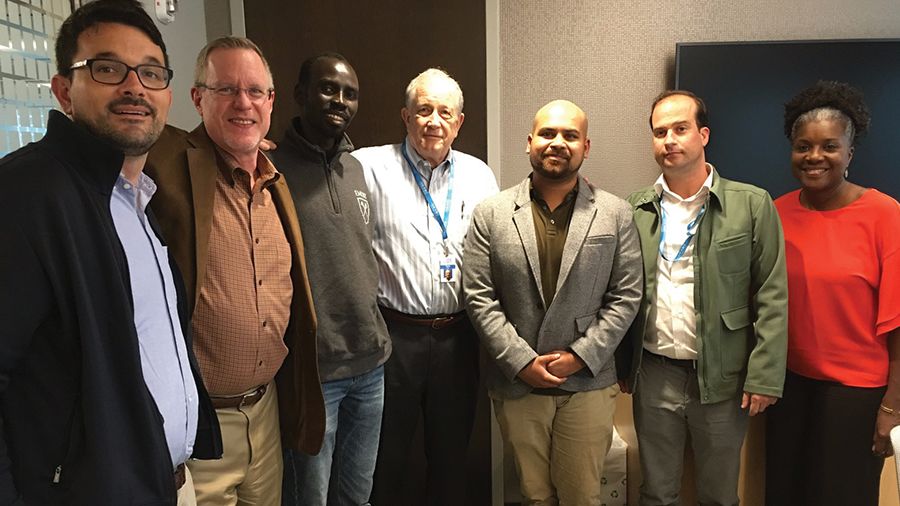
Buk Buk with colleagues at the Task Force for Global Health.
Stobbelaar also connected Buk Buk with a close friend, Kimberly Dickstein, a tenth-grade English teacher at Haddonfield Memorial High School in New Jersey. Dickstein had assigned her students the book A Long Way Gone: Memoirs of a Boy Soldier by Ishmael Beah, and thought interacting with a former child soldier in real time would bring those lessons to life. That’s how Buk Buk started appearing in her classroom via Skype, sharing his story and making far-flung friends who would—again—reroute his future.
Buk Buk was elated when he was accepted to Emory’s MDP program, but his excitement quickly faded as reality set in. He was offered partial scholarships for tuition, but to get a US visa he had to show that he could support himself financially during his time in Atlanta. Despite his efforts to earn and save money, that was not going to happen.
Then Dickstein’s sophomore English class learned that Buk Buk would have to pass up the opportunity to attend Emory’s MDP program.
Marshalled by Dickstein, the band of teenagers organized a crowdfunding effort they called “Bring Garang to Emory” and worked for months to drum up the backing he needed. With the help of Stobbelaar and his wife, Dickstein and her husband, staff from The Carter Center and Emory, and many others, they raised some $58,000—enough to secure Buk Buk a student visa.
Buk Buk is a quiet person. He has a ready smile, but if you ask him about his years as a soldier, a shadow erases his face like a curtain falling. Last September, Dickstein brought the “Garang Five” to the Emory campus to meet Buk Buk in person for the first time.
Waiting in a top-floor conference room, the high school students were abuzz with field-trip excitement and a catered lunch—until Buk Buk walked in and immediately became teary-eyed with emotion. It took all of five seconds for the entire room to follow suit.
“Thank you so much,” Buk Buk told them. “I have been in a society where you say everything is fine even when it is not fine. When I learned I was accepted to Emory, I knew it could not happen. I said it was fine. This, being here, touches me. I don’t have words to explain the innermost of me.”
The younger students seemed hungry for face time with the person they had met on a screen. They asked him a number of questions, including about how life in Atlanta is different from his home in South Sudan.
“Well . . . people here walk dogs on ropes?” he replied. “And restaurant menus have so much, how do you choose? For us, you eat only one thing every day. And it is not dusty! Where I am from, all the time you come home and your clothes are dirty because of the dust.”
With a wide smile, Buk Buk added, “I don’t know how you guys would fit in if you come.”

Buk Buk with Carter Center colleague and friend David Stobbelaar.
Buk Buk with Carter Center colleague and friend David Stobbelaar.

Buk Buk shows a Guinea worm extracted from a patient.
Buk Buk shows a Guinea worm extracted from a patient.

Buk Buk with colleagues at the Task Force for Global Health.
Buk Buk with colleagues at the Task Force for Global Health.
A Moving Landscape
Each summer, Emory’s MDP program scatters some thirty to forty graduate students around the globe to field projects. One of the distinctions of the Emory program is that it requires two stints in the field during two consecutive summers. The first is to learn and develop recommendations; the second is to experiment with actual application of knowledge and skills. “The point is to do development better,” Nugent says. “We see this as a process in which the field dictates what matters.”
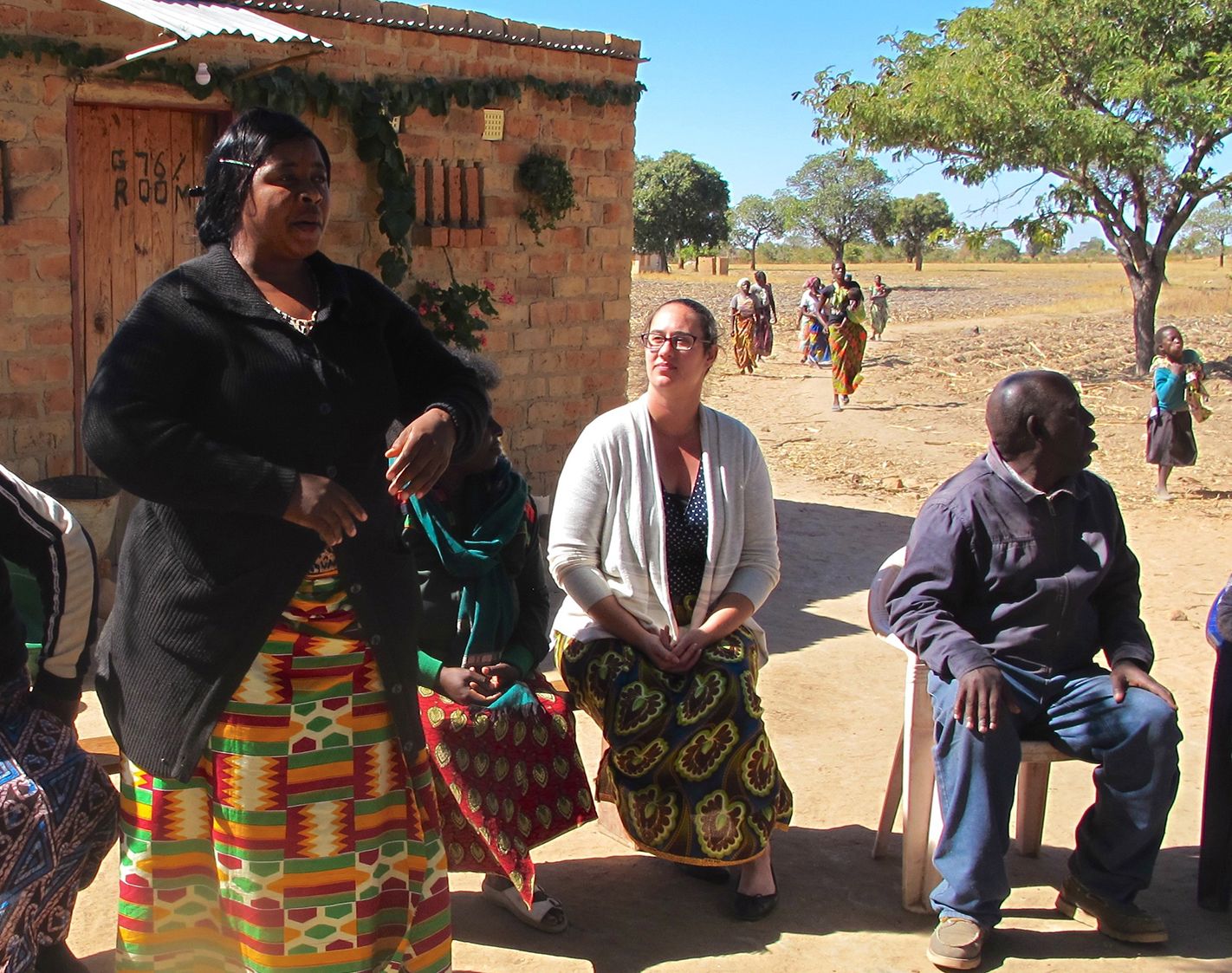
A Kalomo District Administrative Officer thanks a group of women who have spoken about their successes and challenge
According to Carla Roncoli, associate director of the program and coordinator of the field projects, most summers find MDP students working in about twenty countries and in partnership with fifteen to twenty organizations.
The program coaches students to think of themselves as “embedded practitioners”—fully immersed in the communities where they live but also applying critical skills to address challenges and improve day-to-day lives.
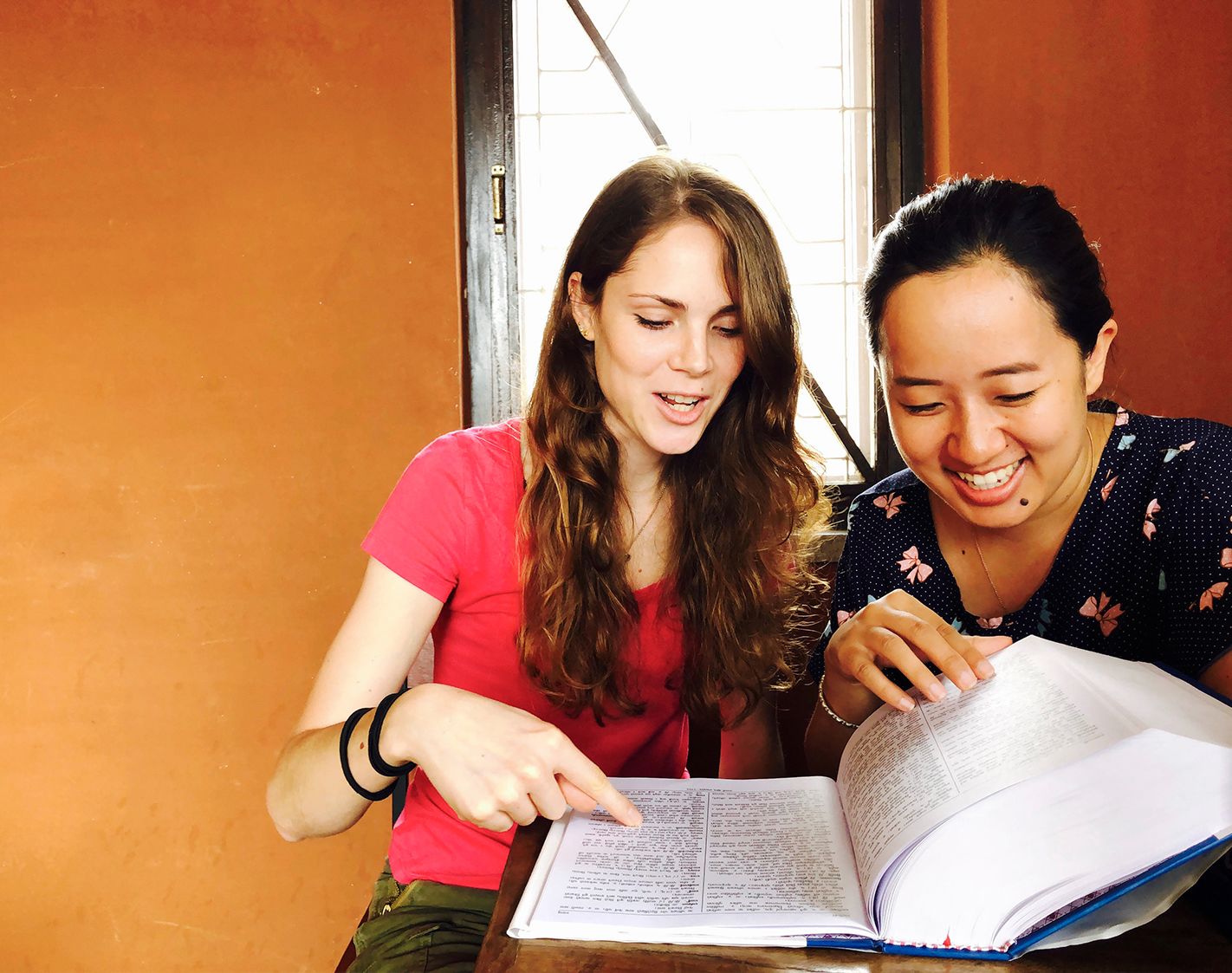
MDP student Melania Croce learns Nepali in Kathmandu
“Students’ interests range from global health to human rights to social enterprise to sustainability,” Roncoli says. “It’s a bit of a moving landscape.
Sometimes an organization will hear about us and request a placement, and sometimes a student will come to us with a particular interest or topic, like empowering women through sports. The defining feature of the program is the close connection between theory and practice, between the classroom and the field.”
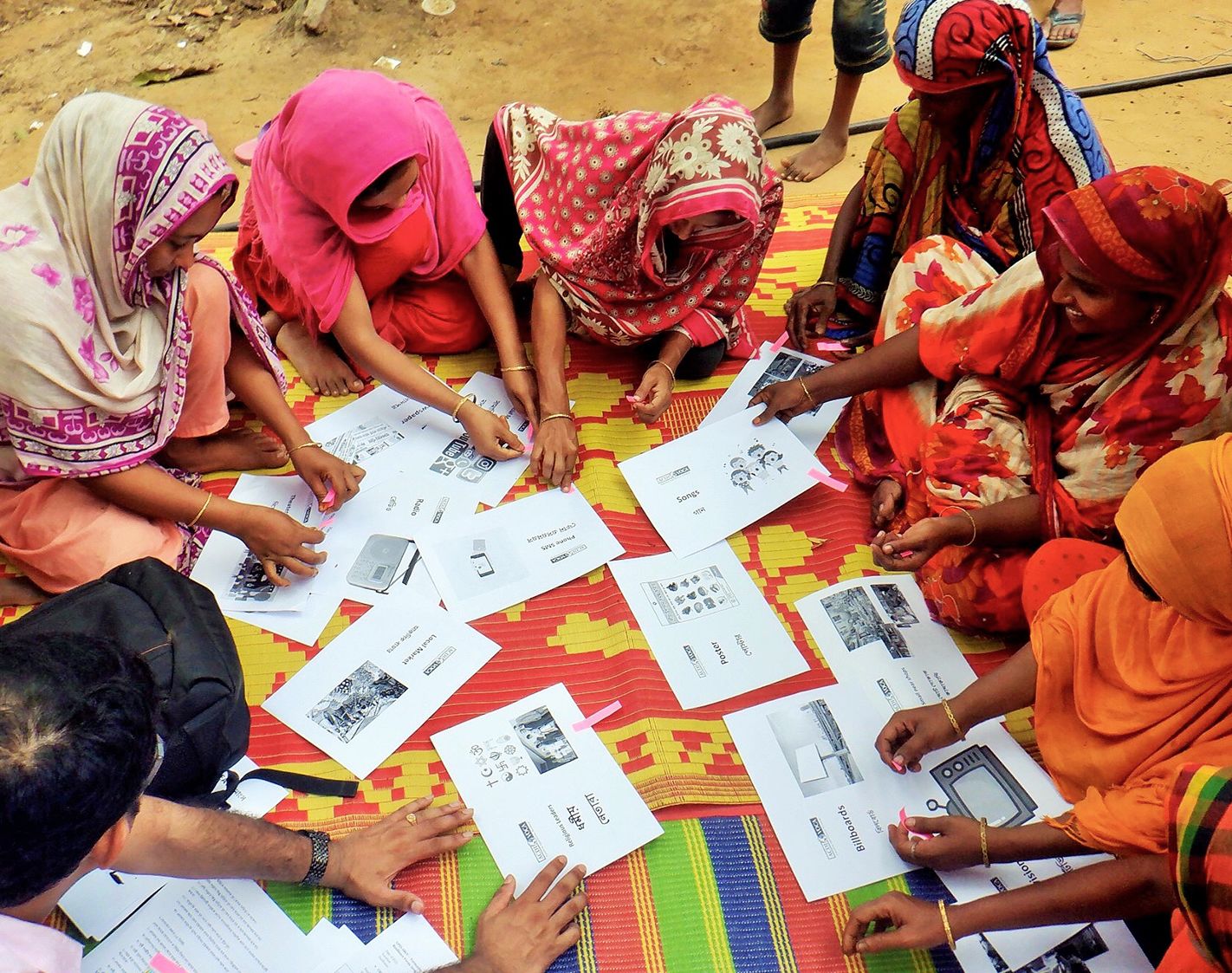
A group of women gather for support and education at Cox's Bazaar in southeastern Bangladesh.
About 10 to 20 percent of MDP students are non-US citizens, and many, like Buk Buk, plan to use their skills in their home countries after completion.
Leslie Abimbola 20G spent the past summer working with Emory’s Child Health and Mortality Prevention Surveillance (CHAMPS) program on the Stakeholder Mapping and Analysis Project with the Kenya site.
After graduation, she plans to work in public health in her home country of Nigeria.
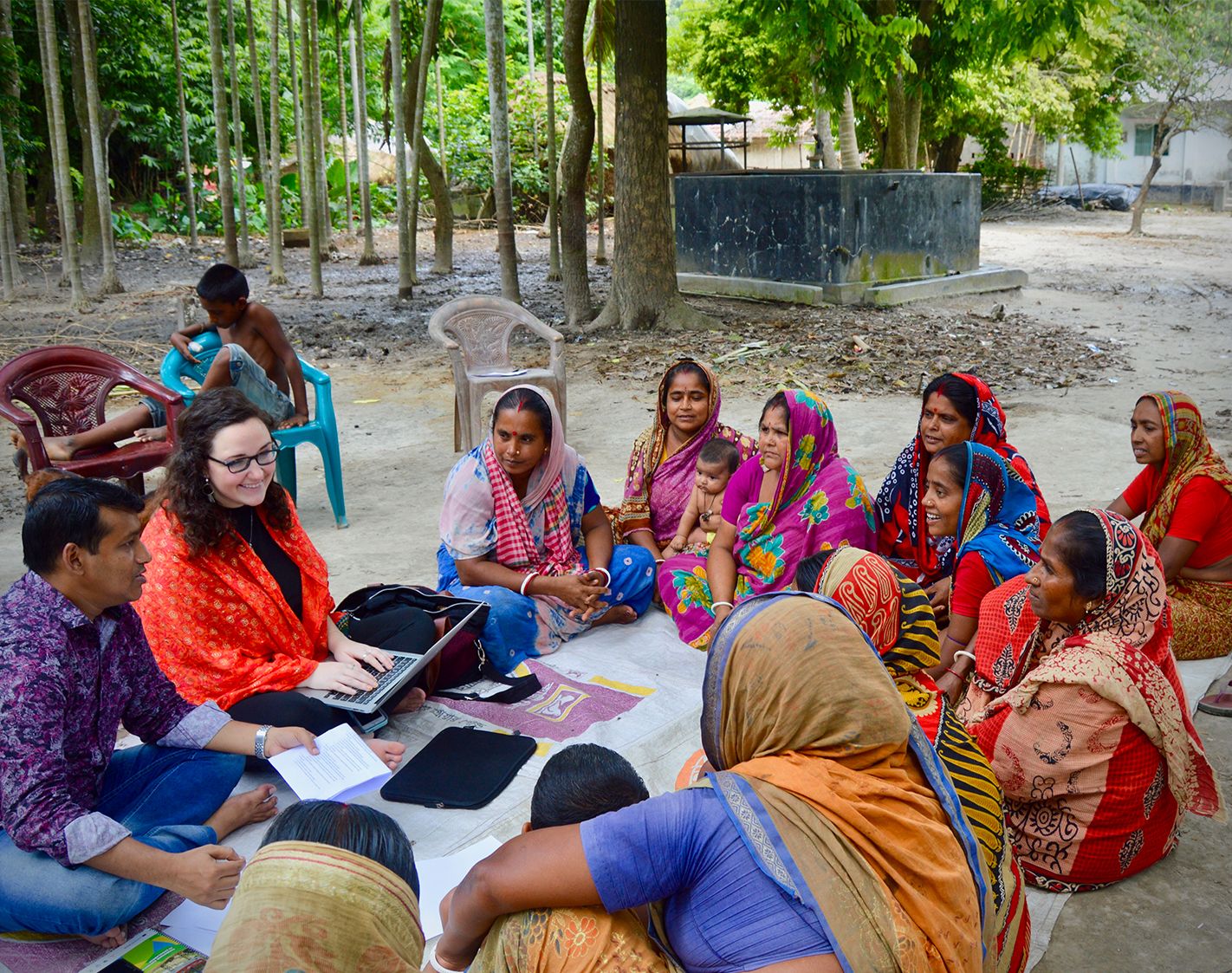
MDP student Katie Pons (center) with a group of Hindu women in Jashore, Bangladesh, discussing livestock and nutrition.
“The main objective of my summer project was to identify key stakeholders working on child survival within the Kenya project areas,” Leslie says. “It was exciting to interact with these organizations, hear them talk about what they do, how they go about their work, the populations they serve, their collaborations, and their challenges. The MDP program provides the ability to translate this knowledge to action, and this helps to make me a better practitioner.”
The Emory MDP program now has about 120 alumni active around the world.
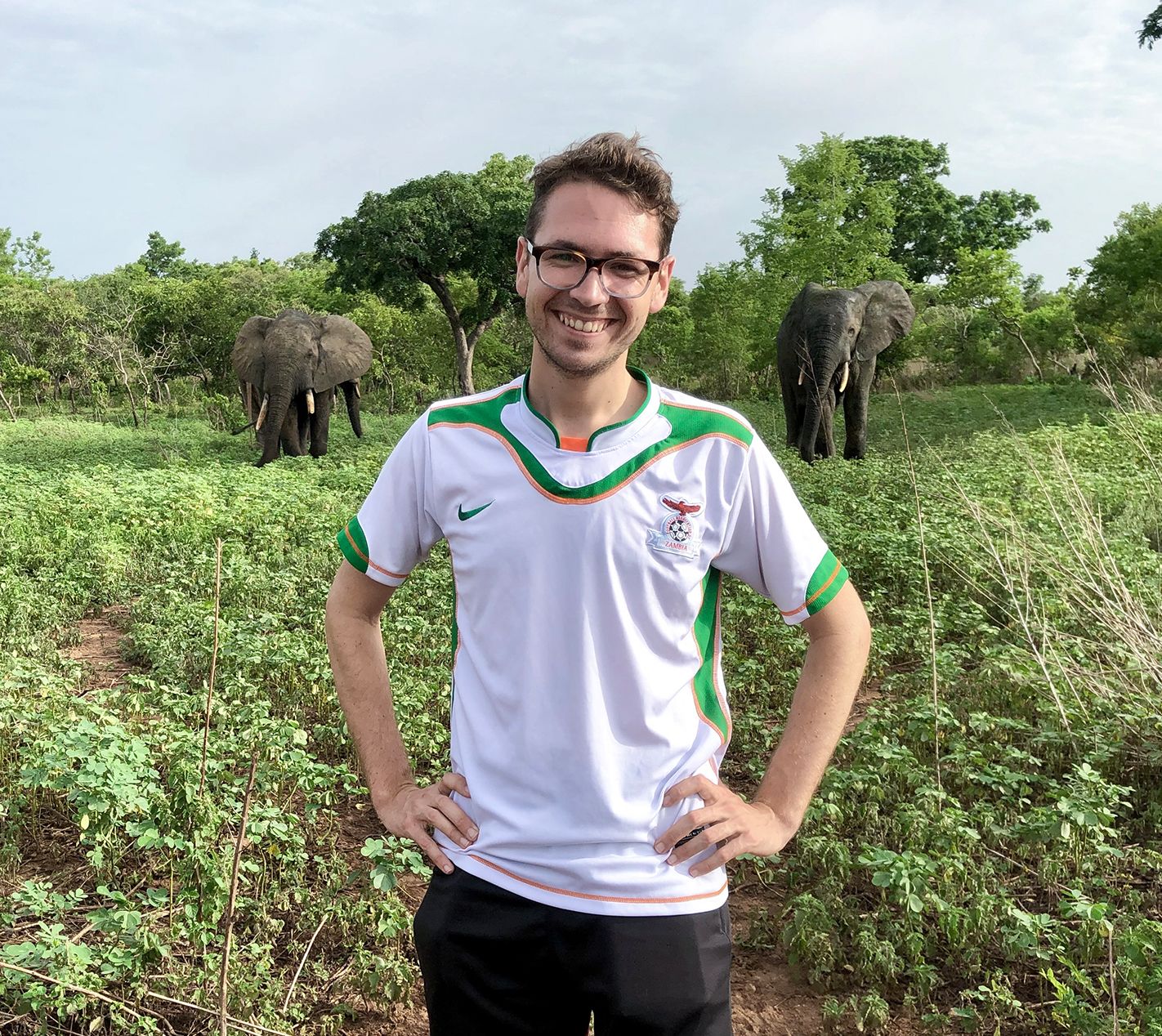
MDP student Ian Hamilton takes a break with elephants in Mole National Park, Ghana
Nafisa Ferdous 13G, who was born in Bangladesh but grew up in New York, most recently worked as the Asia/Pacific program officer for the global women’s and trans funding network Prospera.
“I really appreciate the flexibility that was afforded to me at MDP,” she says. “I had a fairly clear picture of what I wanted to focus on—work at the intersection of gender and environmental justice in Asia. I was taking courses in the public health school’s gender studies department. I crafted a semester-long independent study on transnational farmers’ movements. I studied Bangla in preparation for a field placement in Bangladesh. I worked with several community farms in Atlanta that addressed racial and economic justice issues. I did a lot in my two years at MDP.”

A Kalomo District Administrative Officer thanks a group of women who have spoken about their successes and challenge
A Kalomo District Administrative Officer thanks a group of women who have spoken about their successes and challenge

MDP student Melania Croce learns Nepali in Kathmandu
MDP student Melania Croce learns Nepali in Kathmandu

A group of women gather for support and education at Cox's Bazaar in southeastern Bangladesh.
A group of women gather for support and education at Cox's Bazaar in southeastern Bangladesh.

MDP student Katie Pons (center) with a group of Hindu women in Jashore, Bangladesh, discussing livestock and nutrition.
MDP student Katie Pons (center) with a group of Hindu women in Jashore, Bangladesh, discussing livestock and nutrition.

MDP student Ian Hamilton takes a break with elephants in Mole National Park, Ghana
MDP student Ian Hamilton takes a break with elephants in Mole National Park, Ghana
Step by Step
While his classmates ventured to some of the world’s remote corners, Buk Buk spent his first summer as an Emory graduate student in nearby Decatur, working as an intern with the university-affiliated Task Force for Global Health.
That’s partly because his visa status won’t allow him to leave the US—even to visit his wife, Awau, and three children in South Sudan, including a new baby boy born after he came to Emory.
He worked with David Addiss, adjunct professor in Emory’s Department of Global Health and a senior scientist at the task force, on a study of moral injury, especially how it affects veterans of war.
“It’s a difficult feeling, if you have ever experienced moral injury, you will really feel guilt. I was very young, I did not have a lot of choices, but anything you do can stay with you."—Buk Buk
Moral injury is a relatively recent term for the mental and emotional damage that can result when required actions, such as military combat, directly conflict with one’s values and beliefs.
The irony—or appropriateness—of the assignment is hardly lost on a former child soldier.
“It’s a difficult feeling,” Buk Buk says. “If you have ever experienced moral injury, you will really feel guilt. I was very young, I did not have a lot of choices, but anything you do can stay with you. I look at perspective. How do I build the capacity of communities that are morally distressed? When I go back to South Sudan, those are the people I will be dealing with. Those who have seen their own people dying, taken lives, they are traumatized because they know what they have done is not right. I need to understand my own experience so that I can help others.”
Staub of The Carter Center, one of many who have been moved by Buk Buk’s story, recently traveled to South Sudan for work and managed to meet his wife for a few brief moments on a strip of airplane tarmac between domestic flights. She also held his new baby.
Staub marvels at the network that knits together communities in the world’s youngest country—and also at how everyone, it seems, knows Buk Buk.
“Garang is an inspiration to his fellow Guinea worm contacts still working in South Sudan,” she says. “He talks to folks often, giving guidance, counsel. I met numerous people while I was there who were motivated that Garang got educated and got out, but is coming back.”
Buk Buk has now been named a Foege Fellow by the Rollins School of Public Health. The prestigious honor and accompanying funding from the Bill and Melinda Gates Foundation mean that he can extend his graduate education and be part of the Emory community—but also, a world away from his home and family—for an additional year.
His master’s degrees in both development practice and global health will significantly increase his chances for a meaningful career in South Sudan.
Garang Buk Buk Piol may not know his actual birthday, but on the day he returns home and is able to hold his youngest son, Kuot, for the first time, you might say he’ll be born yet again.
By Paige P. Parvin 96G // Photography Kay Hinton
Design Elizabeth Hautau Karp
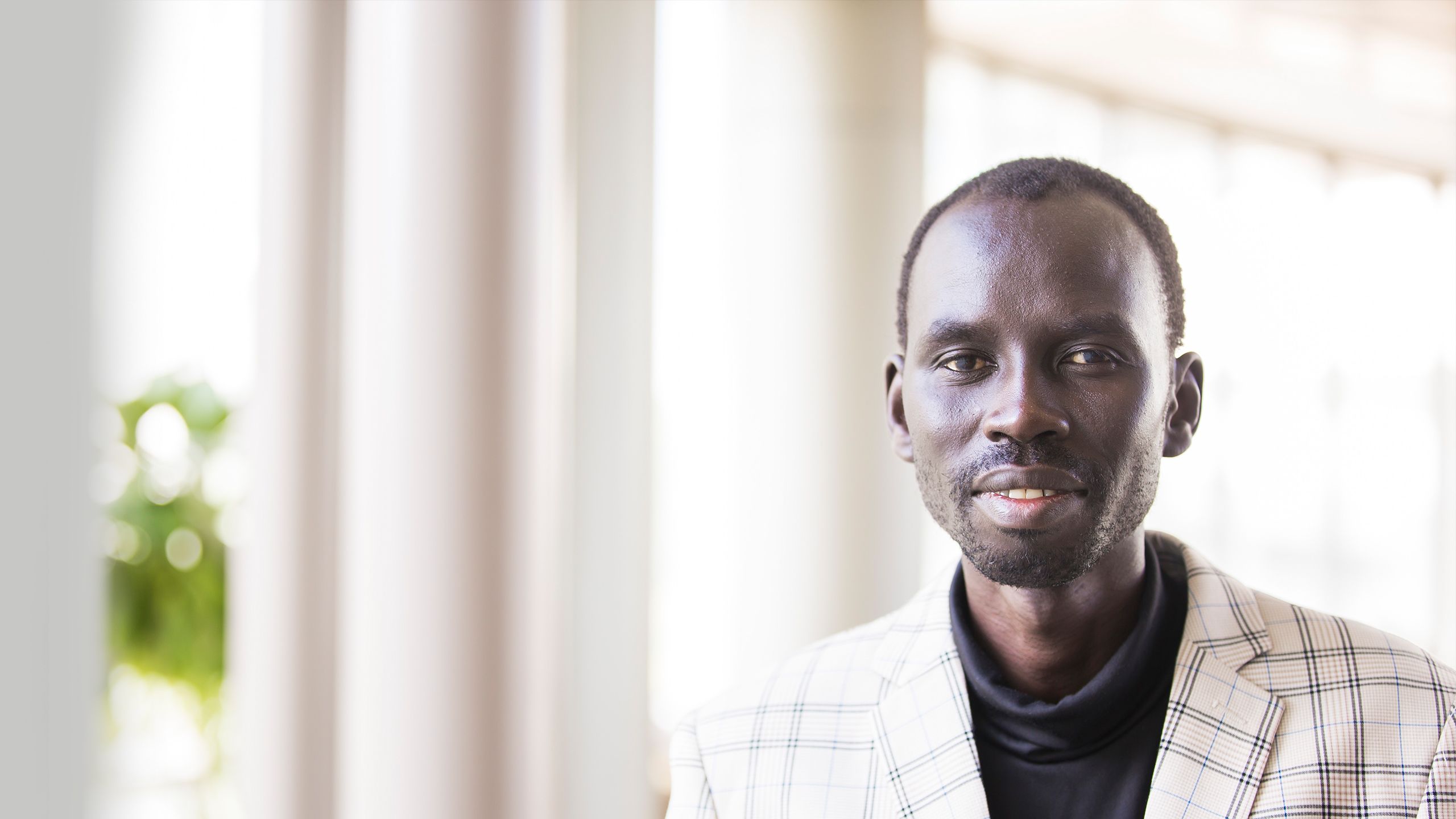
Want to know more?
Please visit Emory Magazine, Emory News Center, and Emory University.


